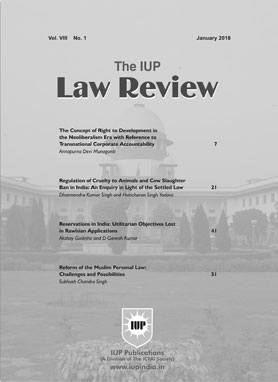
July'23
|
|
The IUP Law Review
ISSN: 2231-3095
A 'peer reviewed' journal indexed on Cabell's Directory,
and also distributed by EBSCO and Proquest Database
It is a quarterly journal focusing on various aspects of law and legal principles/issues relating to Cyber Law, Patent Rights, Copyrights, Insurance Contracts, Risk and Insurance, Banking Regulations (including Cooperative Banks/Rural Banks), Consumer Grievances, E-commerce/Internet Banking, Environmental Pollution, Public Policy, International Agreements and Treaties, Capital Markets, Mutual Funds, Secondary Markets, Medico-Legal, Socio-Legal, Arbitrations and Settlements.
| Focus Areas | |
|---|---|
|
|
|
|
Presumption of Innocence and Burden of Proof: Revisiting Common Law Traditions
The right to a fair trial in general and the right to be presumed innocent in particular, almost in all criminal proceedings, have been recognized as essential aspects of the rule of law. Many international, regional, and national legal regimes signify that individuals who confront criminal allegations should be considered 'innocent', until proved guilty beyond reasonable doubt. The importance and foremost role of this principle are recognized by national constitutions and criminal processes all over the world. However, there is little consensus among jurists about its meaning, scope, and application. The right to be presumed innocent in criminal proceedings is a profound constitutional component of criminal law and procedure. It is closer to providing a ground, the ground of support or shape, but this does not fairly answer why the principle of innocence exists or what kind of protection it offers to the defendants. This is especially because there is no reason why the presumption of innocence cannot be constitutional. While the principle of presumption of innocence in criminal proceedings is part of human rights and fairness, this is not what one perceives. This paper examines the meaning, importance, and application of this basic principle in the fair administration of criminal justice.
Legacy of Transformative Constitutional Jurisprudence in India
The Constitution of India glorifies not only political sovereignty but also economic freedom. The dynamism of law is seen as a crucial factor in societal transformation. The constitution serves as the foundation for individual rights and provides mechanisms to protect fundamental rights. The principle of rule of law is essential for constitutionalism. In a federal structure, the constitution's supremacy is a fundamental feature, and parliamentary affairs should not overshadow it. The judiciary plays the most pivotal role in interpreting legislative and executive actions, contributing to the essence of constitutionalism. Judicial dynamism has been instrumental in safeguarding the rights of citizens against arbitrary state actions. The essence of constitutionalism also supports social transformation through legislative modernization, contributing to societal development. Therefore, as noted in this paper, the concept of constitutionalism promotes a philanthropic constitutional essence aimed at establishing a welfare state as well as maintaining social equilibrium.
Legal Implications of Valid and Invalid Reservations to Treaties
hroughout history, states have engaged in the practice of forming treaties with one another for various purposes, such as maintaining stability and harmony, fostering cooperation across diverse domains, and declaring or terminating wars. A state may exercise the option of reserving a provision of a multilateral treaty, whereby it declares its non-acceptance or non-agreement to be bound by a particular provision of the treaty. This enables a state to participate in a treaty while retaining the option to not adhere to certain provisions. A state may have various reasons for reserving a treaty provision, such as differences in religion, society, culture, and other factors. The Vienna Convention on the Law of Treaties, established in 1969, serves as the preeminent source of international law that regulates the creation, implementation, and interpretation of treaties among states. It contains provisions that govern the circumstances under which a state may reserve a treaty provision and the legal effects of such reservations. This paper examines the concept of treaty reservations, as well as the conditions under which they are valid. It also discusses the formalities required, acceptance and objections to reservations, and the legal implications of valid reservations. Finally, it analyzes the impact of invalid reservations, particularly the connection between invalid reservations and state consent and the severability of invalid reservations.
Earnings from Online Gaming and Tax Implications: The Indian Scenario
The online gaming industry has been growing exponentially. With more and more people owning smartphones, personal computers, and affordable data packs, the industry has seen a massive spurt. New types of attractive games and massive prizes are attracting thousands of new gamers. According to some estimates, around 150,000 players and 60,000 teams from India are involved in online gaming, which includes eSports and online betting/gambling. They have become one of the easiest and relatively risk-free ways to earn money by winning quick cash, depending both on chance and skill. With such massive capital involved, issues relating to taxation arise. Different amounts of tax are levied depending on the nature of the games. This paper provides an overview of the issues relating to direct taxation of income derived from eSports. Various aspects of winnings from online gaming are also looked at through the lens of the Income Tax Act, 1961.
| Click here to upload your Articles |
Journals
Magazines
- HRM Review
- Marketing Mastermind
- Global CEO
- The IUPs World of IOT
Articles of the Month


 ISBN: 978-81-314-2793-4
ISBN: 978-81-314-2793-4Price: ₹250
Payment by D.D. favouring
"ICFAI A/c IUP", Hyderabad
Reach us at
info@iupindia.in
Tel: +91 8498843633